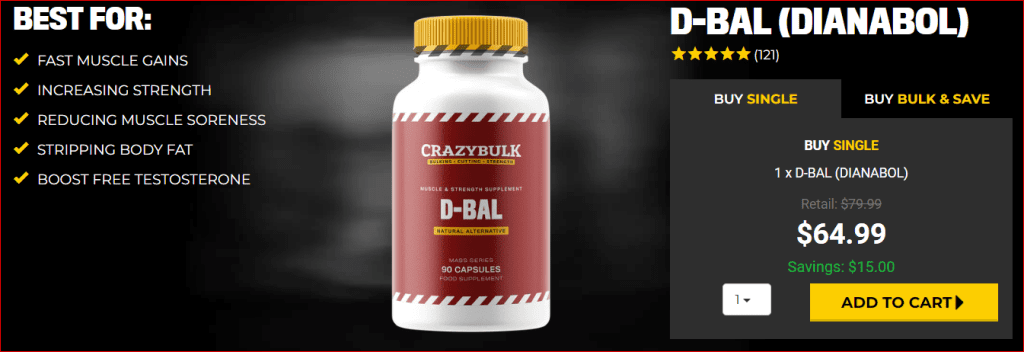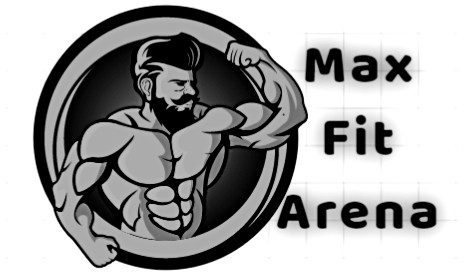Can Dianabol cause a heart attack? A Look at the Evidence

Introduction
Can Dianabol cause a heart attack? Dianabol, known as the breakfast of champions, is not a steroid to be taken lightly. As much as it can boost your strength and increase your muscle growth, the things you sacrifice for these results may be more than you can chew; one of them may be a heart attack. Continue reading as I expound on Dianabol’s relation to heart attacks, the effective ways to use it, the benefits, and other side effects.
Buy Dianabol alternative (D-bal) from Crazy Bulk Official Website
What does Dianabol do to your body?
Dianabol, though one of the oldest standing steroids, has some great benefits to offer to bodybuilders, one of which is body muscle buildup and increased strength. It does this by enhancing protein synthesis in the body. The process through which the body creates new proteins, particularly those required for muscle growth and repair, is known as protein synthesis. Dianabol speeds up the body’s rate of protein synthesis, enabling faster muscle growth and repair.
Dianabol also accelerates nitrogen retention in the muscles, which is an essential building block for proteins, By increasing nitrogen retention, Dianabol helps facilitate the building of new muscle tissue.
Dianabol can also speed up glycogenolysis, the body’s process of breaking down stored glucose in the form of glycogen. This gives the body a source of energy during demanding workouts, which can increase strength and endurance.
For a bodybuilder who’s looking to gain muscles and reach the body’s full potential, it gets kind of hard to resist a drug that provides these seemingly irresistible features, but not so fast—we’ll be getting to the other side of this coin pretty soon.
Can Dianabol cause a heart attack?
Let’s start by saying that taking Dianabol can be a real heartbreaker, and not in a good way. Here’s how it works: When you pop those little pills, they can increase your blood pressure and cholesterol levels, which can put a serious strain on your heart. Over time, this strain can cause damage to your blood vessels, which can lead to a heart attack.
But that’s not all! Dianabol can also mess with your hormones, which can cause your heart to work harder than it needs to. This can lead to left ventricular hypertrophy, which is just a fancy way of saying that your heart muscle gets bigger and thicker. And while that might sound like a good thing, it can make your heart less efficient and increase your risk of heart failure.
So there you have it. Dianabol can be a real heartbreaker. If you’re thinking about taking it, make sure you talk to your doctor first and weigh the potential risks against the benefits. And if you’re looking for a good way to get your heart pumping, why not try a brisk walk or a dance party in your living room? Your heart (and your body) will thank you!
Is heart damage from steroids reversible?
This is not a straight yes or no question; it is an “it depends” answer, and here’s why.
In certain circumstances, the cardiac damage induced by steroids can be reversed. You might be able to undo some of the harm if you discover it early and take efforts to minimize your steroid use and improve your heart health (such as working out frequently, eating well, and quitting smoking).
But it might not be possible to reverse the damage if you’ve been using steroids for a long time or if it is very severe. And that’s no joke; heart damage is serious business, and you don’t want to mess around with it.
So, if you’re using steroids and you’re worried about your heart health, talk to your doctor. They can help you figure out the best course of action and make sure you’re taking care of your heart in the best way possible.
What is the best way to take Dianabol safely?
As intense as the side effects of this steroid are, with proper dosage and intake, it is possible to mitigate them, but you’ve got to pay proper attention to a couple of things:
Your recommended dosage for Dianabol is 25–40 mg for 4-6 weeks. If you’re a beginner, I seriously recommend that you stick with the low dosage of say 25–30 mg, and for someone already used to these kinds of drugs, you should be fine around 40 mg, but you have to stick to the 4-week cycle, and I’m not kidding, stick to the 4-week cycle. When you use Dianabol for a prolonged time, it doesn’t do good to your heart and liver, so no matter the fitness goal you’ve set for yourself, please prioritize your health over those goals.
Due to its strong aromatization, it is frequently advisable to combine Dianabol with an aromatase inhibitor. Arimidex or letrozole are two common options. This is especially true if you use d-bol to start a testosterone cycle because it has a high aromatization rate. As always, careful observation is advised, and having additional medications on hand, like an anti-E, will enable you to promptly treat any developing gynecomastia symptoms. It’s critical to keep in mind that gains from d-bol result partially from water retention.
And finally, you’ll most likely need PCT to replenish your testosterone levels, so keep that in mind.
What are the other side effects?
I told you I’d get to the sides shortly. I’ll tell you this for free: Dianabol is no joke when it comes to side effects! I mean, sure, it can give you some serious gains in the muscle department, but at what cost? Here are just a few of the possible side effects of Dianabol:
First of all, there’s the risk of acne. And not just any acne—we’re talking about some serious, pizza-face-level breakouts. I don’t know about you, but I’d rather have clear skin and a slightly less jacked bod.
Then there’s the risk of hair loss. Yep, you heard me right: taking Dianabol can make your luscious locks fall out faster than you can say “hair transplant.” And let’s face it, nobody wants to be a bald bodybuilder.
Oh, and let’s not forget about the mood swings. One minute you’re feeling like a total beast in the gym, and the next minute you’re crying over a sad commercial on TV. Not exactly the most stable emotional state to be in, if you ask me.
And that’s not even mentioning the more serious side effects, like liver damage, high blood pressure, and an increased risk of a heart attack. Yikes.
So, if you’re thinking about taking Dianabol, make sure you weigh the potential risks against the benefits. And remember, there are plenty of other ways to get fit and build muscle that doesn’t involve risking your health (or your hairline).
What is the Dianabol safe and legal alternative?

D-Bal is your go-to guy for safe and effective results and is designed to mimic the effects of Dianabol without any of the nasty side effects. It’s made from natural ingredients like whey protein, L-isoleucine, and Tribulus Terrestris, so you can feel good about what you’re putting in your body.
Another option is a product called Trenorol, which is designed to mimic the effects of the steroid trenbolone. Like D-Bal, it’s made from natural ingredients and is designed to help you build muscle, increase strength, and improve your overall fitness.
Conclusion: Can Dianabol cause a heart attack
Yes, it most certainly can. Yet, that doesn’t mean you have to completely give up on your fitness objectives. Just make sure you’re taking care of your body and consuming supplements like the ones I described above that are secure and efficient. And if you ever have any doubts regarding the security of a specific vitamin or exercise regimen, don’t be afraid to speak with a medical expert. Your heart (and the rest of your body) deserve nothing less, after all.
FAQ
Why do steroids worsen heart failure?
When you’re taking steroids, your body produces more red blood cells, which can make your blood thicker and harder to pump through your heart. This can put extra strain on your heart and make heart failure worse. Plus, steroids can also cause high blood pressure, which can further damage your heart. So, if you’re dealing with heart failure, it’s best to stay away from steroids.
Is testosterone bad for the heart?
Although testosterone is crucial for maintaining a healthy heart, taking too much of it (like with steroids) can have negative effects. Hence, just like with many other things in life, balance is key.
Does Dianabol increase blood flow?
It is feasible. Red blood cell synthesis may be increased by Dianabol, which may enhance oxygen delivery to your muscles. It’s a double-edged sword, though, because, as I already explained, this can also make your blood thicker and harder to pump through your heart.
What are the long-term effects of Dianabol?
Unfortunately, there’s not a ton of research on this topic, but some possible long-term effects could include liver damage, high blood pressure, and an increased risk of heart disease.
Can steroids cause a fast heart?
Absolutely, steroids can cause your heart to beat faster than normal, which can result in cardiovascular issues.
Is Dbol bad for your blood pressure?
You betcha. Dianabol can cause high blood pressure, which can damage your blood vessels and put extra strain on your heart. So if you’re dealing with hypertension,
Do anabolic steroids grow your heart?
Yes, anabolic steroids can cause your heart to grow—but not in a good way. When you take steroids, they can cause your heart muscle to increase in size, which might sound like a good thing at first. However, this can make your heart less efficient at pumping blood, which can increase your risk of heart disease and other health problems. So while your muscles might get bigger with steroids, it’s important to remember that your heart shouldn’t be one of them!
Can steroids cause sudden cardiac death?
Well, it’s a possibility. Steroids can increase your risk of heart disease, which can lead to sudden cardiac death in some cases. So, once again, it’s important to be careful when it comes to using steroids and to prioritize your heart health above all else.
